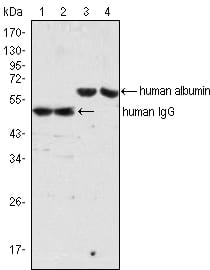
| WB | 咨询技术 | Human,Mouse,Rat |
| IF | 咨询技术 | Human,Mouse,Rat |
| IHC | 咨询技术 | Human,Mouse,Rat |
| ICC | 技术咨询 | Human,Mouse,Rat |
| FCM | 咨询技术 | Human,Mouse,Rat |
| Elisa | 1/5000-1/10000 | Human,Mouse,Rat |
| Aliases | PRO0883; PRO0903; PRO1341 |
| Entrez GeneID | 213 |
| clone | 8F6F9 |
| WB Predicted band size | 69kDa |
| Host/Isotype | Mouse IgG1 |
| Antibody Type | Primary antibody |
| Storage | Store at 4°C short term. Aliquot and store at -20°C long term. Avoid freeze/thaw cycles. |
| Species Reactivity | Human |
| Immunogen | Human sera albumin. |
| Formulation | Purified antibody in PBS with 0.05% sodium azide. |
+ +
以下是关于HBP1抗体的3篇文献示例(注:以下内容为示例性概括,具体文献信息请以实际检索为准):
---
1. **文献名称**: *HBP1: A Transcriptional Repressor Regulating Cell Cycle Progression*
**作者**: Wang, G.L., et al.
**摘要**: 该研究首次报道HBP1作为HMG-box家族成员,通过抑制Cyclin D1转录调控细胞周期进程。文中利用特异性HBP1抗体进行染色质免疫沉淀(ChIP)和Western blot分析,证实其在G1/S期转换中的抑制作用。
2. **文献名称**: *HBP1 Suppresses Wnt/β-Catenin Signaling and Tumorigenesis in Colorectal Cancer*
**作者**: Xia, Y., et al.
**摘要**: 研究揭示HBP1通过拮抗Wnt信号通路抑制结直肠癌进展。实验中使用HBP1抗体进行免疫组化(IHC)和流式细胞术,发现HBP1低表达与患者预后不良相关,其缺失促进肿瘤细胞增殖。
3. **文献名称**: *Epigenetic Silencing of HBP1 in Hepatocellular Carcinoma*
**作者**: Zhang, L., et al.
**摘要**: 本文探讨肝癌中HBP1的表观遗传失活机制。通过HBP1抗体的Western blot和免疫荧光实验,证实DNA甲基化导致HBP1表达下调,进而激活AKT/mTOR通路,促进肝癌发展。
---
**提示**:建议通过PubMed或Google Scholar检索最新文献,使用关键词“HBP1 antibody”或“HBP1 AND (Western blot/IHC)”以获取具体研究。部分文献可能侧重抗体应用(如克隆号、验证数据),可结合实验需求筛选。
**Background of HBP1 Antibody**
The HBP1 (HMG-box transcription factor 1) antibody is a tool used to detect and study the HBP1 protein, a member of the high-mobility group (HMG)-box family of transcriptional regulators. HBP1 functions as a tumor suppressor and cell cycle regulator by binding to specific DNA sequences to repress or activate target genes involved in proliferation, differentiation, and senescence. It is notably implicated in regulating pathways like Wnt/β-catenin and Rb-E2F, often by suppressing oncogenic signals or inducing cell cycle arrest through proteins such as p21 and p16INK4a.
HBP1 antibodies are widely utilized in research applications, including Western blotting, immunohistochemistry (IHC), and immunofluorescence (IF), to analyze HBP1 expression levels, subcellular localization, and interactions in various tissues or cell lines. Studies have linked HBP1 dysregulation to cancers (e.g., breast, liver, and colorectal), neurodegenerative diseases, and aging, highlighting its role in maintaining genomic stability and cellular homeostasis.
Developed against specific epitopes of human HBP1. these antibodies are validated for specificity and sensitivity, often in knockout-validated models. Researchers rely on HBP1 antibodies to explore its dual roles in tumor suppression and context-dependent oncogenic activity, providing insights into therapeutic targets for cancer and age-related disorders. Commercial HBP1 antibodies are available from multiple suppliers, tailored for diverse experimental needs.
×